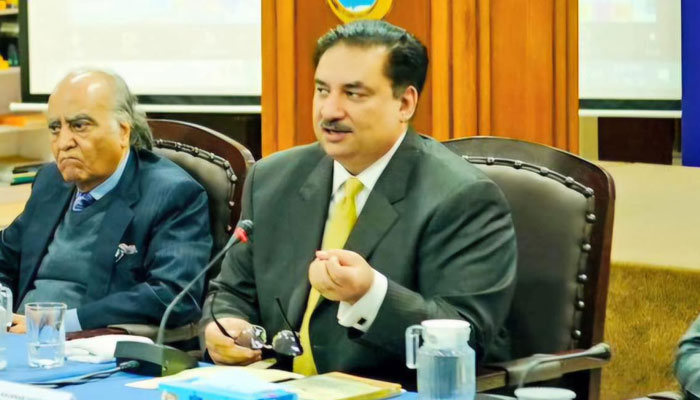Pakistan will have to work with Afghanistan despite challenges: Dastagir
Islamabad:Former Federal Minister Khurram Dastagir Khan, has said that the current regime in Afghanistan is evidently there to stay and Pakistan will have to work with it and there are several challenges like terrorism that threaten both Afghanistan and Pakistan.
Mr Dastagir was delivering keynote address at launch of the book “Navigating uncertainty: perspectives on post-Taliban Afghanistan and geopolitical footsteps" hosted by Institute of Strategic Studies (ISS). The book was edited by Sheharyar Khan and jointly published by Hans Seidel Foundation (HSF) and National Dialogue Forum (NDF).
Mr Dastagir opined that Pakistan will have to find a way amidst these complexities. Afghanistan is a crucial transit country from South Asia to Central Asia and the post-withdrawal Afghanistan for the first time in many decades is territorially united. There is a tremendous decline in narcotics, increase in primary school enrolment and a lot of attention is being paid to rural Afghanistan.
Sheharyar Khan, Executive Director, NDF, while introducing the book, said that Afghanistan, often regarded as the heart of Asia, has long been at the crossroads of cultures, conflicts and aspirations. Following the seismic shift marked by the Taliban’s return to power, it became evident that we needed to look beyond the prevailing narratives of war and chaos. He said the purpose of this book is to illuminate the complexities of Afghanistan by bringing together diverse perspectives that dissect the nation's political, economic, and social realities.
Amina Khan, Director, ISS, stated that the book represents a significant intellectual contribution providing nuanced and wide ranging perspectives on a subject of profound importance as reflected in the title. She further said that at a time when the discourse on Afghanistan often seems dominated by narratives from outside the region, it is encouraging to see such a compelling body of work emerging from within our own part of the world, not only adding to the academic discourse but more so providing authenticity often missing in external narratives.
Dr Hassan Abbas, Distinguished Professor, Near East South Asia Strategic Studies Centre (NESA), National Defense University in Washington DC, highlighted key issues surrounding Taliban governance, security and regional dynamics.
-
 Margot Robbie Delivers Sweet Message Ahead Of Valentine's Day
Margot Robbie Delivers Sweet Message Ahead Of Valentine's Day -
 How AI Boyfriends Are Winning Hearts In China: Details Might Surprise You
How AI Boyfriends Are Winning Hearts In China: Details Might Surprise You -
 Blake Lively Mocked Over 'dragons' After Latest Court Appearance
Blake Lively Mocked Over 'dragons' After Latest Court Appearance -
 Gmail For Android Now Lets Users Create Labels On Mobile
Gmail For Android Now Lets Users Create Labels On Mobile -
 Emma Slater Reveals Final Moments With James Van Der Beek Before His Death
Emma Slater Reveals Final Moments With James Van Der Beek Before His Death -
 Princess Kate Makes Surprise Visit To Support Mental Health Initiative
Princess Kate Makes Surprise Visit To Support Mental Health Initiative -
 Reese Witherspoon Sparks Nostalgia With 'Green Sisters' Tribute To Jennifer Aniston
Reese Witherspoon Sparks Nostalgia With 'Green Sisters' Tribute To Jennifer Aniston -
 Royal Family Faces Fresh Crisis While Andrew's Controversy Refuses To Die
Royal Family Faces Fresh Crisis While Andrew's Controversy Refuses To Die -
 Travis Kelce’s Mom Talks About Taylor Swift’s Wedding Dance Song And Whether She’s Signed An NDA
Travis Kelce’s Mom Talks About Taylor Swift’s Wedding Dance Song And Whether She’s Signed An NDA -
 James Van Der Beek's Final Days 'hard To Watch' For Loved Ones
James Van Der Beek's Final Days 'hard To Watch' For Loved Ones -
 Lewis Hamilton Ditched Question About Kim Kardashian?
Lewis Hamilton Ditched Question About Kim Kardashian? -
 Will Smith, Jada Pinkett's Marriage Crumbling Under Harassment Lawsuit: Deets
Will Smith, Jada Pinkett's Marriage Crumbling Under Harassment Lawsuit: Deets -
 'Fake' Sexual Assault Report Lands Kentucky Teen In Court
'Fake' Sexual Assault Report Lands Kentucky Teen In Court -
 'Vikings' Star Shares James Van Der Beek's Birthday Video After His Death
'Vikings' Star Shares James Van Der Beek's Birthday Video After His Death -
 Jennifer Aniston Receives Public Love Note From Jim Curtis On 57th Birthday
Jennifer Aniston Receives Public Love Note From Jim Curtis On 57th Birthday -
 Microsoft AI Chief Says AI Will Replace Most White-collar Jobs Within 18 Months
Microsoft AI Chief Says AI Will Replace Most White-collar Jobs Within 18 Months




